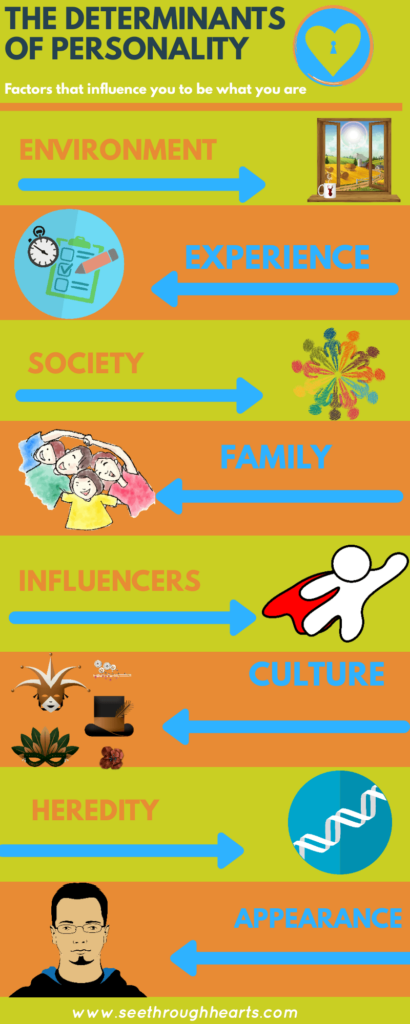The word personality is derived from a word in Latin that means a mask, ‘persona’. Yes, it couldn’t be because we fabricate what we are, on occasion. It’s the accumulation of traits and habits that we develop over time by which our behavior and response become sort of predictable, most of the time. Here we’ll discuss the determinants of personality, and factors that determine personality.
What does personality mean?
“Personality is the sum total of all the biological innate dispositions, impulses tendencies and instincts of the individual, and the acquired disposition and tendencies acquired by experience.”
Morton Prince
A broad term, so much so that there’s a huge incomplete discussion behind it. Have we understood ourselves? our nature, the way we are, and what makes us, us? The nonapparent features that we own make us along with the physical ones.

These traits and factors make a personality
And together we all are an individually separate and unique blend of qualities that make us into the types of personalities we are. What are those traits and qualities define a personality? Let’s have a look at the major determinants of personality that make us.
Self-respect:
How much respect you have for yourself defines how much respect you will get from others. Did you ever think about how much you honor yourself? I’m not asking you about the complacency you might have for yourself, because I wouldn’t support it.
But what I ask is what is your tolerance level for being disrespectful to yourself? Let me simplify it, do you tolerate dishonoring yourself by being inappropriate or unjust, or dishonest? This could also be considered one of the intellectual determinants of personality.
Being dishonest to anyone is being dishonest to yourself. Because deep inside you won’t like it and for the same reason you’ll have to justify to yourself by creating an illusion of a rational reason which wouldn’t be rational enough to satisfy the deep inside of you. Remember this when you define personality.
Is your personality the same inside out?

To simplify it further, I have a question for you; do you behave differently in social presence? Why? Isn’t it to maintain your dignity in front of those particular individuals?
No matter how close we have a level of dignity to preserve with everyone differently. More with strangers and lesser with those close to you. And what about the one closest to you? Yourself.
How you behave in the presence of yourself reflects how much you respect yourself. This is how you define personality. And trust me, I don’t know how, but this leaves a huge impact on your impression of others.
Discipline
Discipline is primarily how we perceive an ideal way of doing something. There are a set of rules as to how a thing or work should be done for every one individual which defines a personality. A priority is sometimes very obsessive which reflects their personality type. You’re more satisfied and happy when things are your way and you get uncomfortable otherwise.
Eat dinner with a stranger and you can guess his or her background and personality type based on table manners. People with a strict schedule and principles in life get asked by someone of their type. And this is written all over their face, including the way they dress and speak.
Punctuality
Such personality types, the disciplined ones are very particular about their time and schedules. And they like getting the work done and getting it done in time and with perfection.
They make good leaders if they have other supporting characteristics of leadership qualities. Any delay or irregularity frustrates them. This punctuality defines their personality.
Taste of dress

The way we dress is a part of discipline and also self-esteem and self-respect and hence a part of how we define personality. It is how you want to be seen by others. When you won’t tolerate irregularity in your schedule and work, you don’t tolerate any noticeable flaw in your dress.
The way you smell and the tolerance of to what extent you can let your clothes get dirty also reflects your personality type.
Body language
The moment a person enters the room, you decide as to how much respect will you give that person, a total stranger. Then you take this decision subconsciously, without even a word of communication. Often times in just a glance. But have you ever thought about why? What did you see in that person? What influenced your decision?
Start looking around and see the difference in people the way they walk, talk, and the expressions they make. Every move you make and the way you make it will define your personality.
Confidence
This again is interlinked to what we have already discussed above, if you dress well, if you’re punctual and you are disciplined then eventually you’ll be a more confident personality and if so then your body language will reflect your confidence level.
Watch anyone, you can tell at a glance whether that person is confident or not. Nervousness is sensed even by animals, dogs and horses don’t respond very well to nervous people.
Introvert or extrovert
Another major determinant of personality is how good and how comfortable are you in conveying your thoughts and feelings to others, how comfortable are you in approaching them? You might be the one who has the candor to just go and speak with anyone around you.
On the contrary, you might be the one who has millions of thoughts before approaching a stranger. Some are just not comfortable in their own space and tolerate less invasion. This is also a factor that shows our personality type. Some of us are introverts and some are extroverts.
Charisma

Most extroverts might have this quality. For instance, have you seen anyone seeing whom you just feel like going and speaking with that person? You just feel like going and trusting that person, just feel like his or her presence makes you happier and hence you enjoy the company.
The person who has no problem making friends, yes this charisma is a part of personality and every personality type has a different level of charisma. This character could be the result of biological determinants of personality or even environmental ones.
Warmth:
This is more of a part of being charismatic, or you’ll at least be a more charismatic personality type if you have that warmth in you. You are good at comforting others, making them feel special, and showing and expressing that special bond you feel with them. They will certainly feel the warmth in you and you will be a very approachable persona for them.
It’s about how much you care and how much you appreciate others’ presence. How much of a good host you are not only in your house but in every situation.
The wide warm smile that glows on your face the moment you see someone lights up their mood and the warmth is transferred. Moreover, the feeling of the energy of which you are the powerhouse if you have the warmth in your personality type. This warmth also defines your personality.
Humor

Just like charisma and warmth, the characteristics which support a personality type and define a personality are humor, smile, and how you respond to people when approached.
And this all will come naturally to you if you are a warm personality. Hence these actions and reactions of ours play a vital role to define the personality we own.
Are we hard-wired?
Is our personality type decided the moment we are born or even before that? When we are in a stage of a human being under progress? Is it just our organs that are being made or even our personality in the prenatal period? Are the major determinants of personality modifiable?
Is it all genetic or there are aspects that play a role in the making of our personality type and defining personality? The answer is listed in the article further as we speak of the determinants of personality.
How are personalities formed?
We come to this world as human offspring, babies, and individuals with no traits and habits, hence no personality. In fact, we don’t even own a name. Every day we live adds to our experience, feelings, memories, and reactions resulting in the formation of a pattern with which we’ll refer to or even be forced to live, our personality.
It’s not just the way we look and our physical characteristics but also the way we are, our personality, and our character that differentiates us. The determinants of personality that shape it.
Personality is a very diverse and complex psychological concept. The word ‘personality’ may mean something like outgoing, invigorating interpersonal abilities … but we must also recognize and explain the fact that development results in man acquiring a distinctiveness or uniqueness which gives him identity which enables him and us to recognize him as apart from others. These distinguishing characteristics are summarized by the term ‘personality
James D Thompson and Donald Van Houten

Can personalities change?
Haven’t you met someone whom you always knew as a different person until you see that person after years? And what you see if that person isn’t what you expected, because the perception of the person was based on your memory of the past. And now you see an entirely different person in the same skin.
What do you think must’ve changed? Of all the determinants of personality, few are modifiable. That being said, as the cause is flexible so could the effect be.
Personality Traits
There are many methods to consider the personalities that people have, Gordon Allport and different “personologists” claimed that we can satisfactorily recognize the variations among individuals through their personality traits.
The simple dimensions on which human beings differ (Matthews, Deary, & Whiteman, 2003). There is a confined variety of these dimensions (dimensions like Extraversion, Conscientiousness, or Agreeableness), and every individual falls somewhere on each dimension, which means that they will be low, medium, or excessive on any precise trait.
It’s important to understand that these traits aren’t discrete, rather they are analogously distributed in every individual. In simple terms, a person isn’t either an extrovert or an introvert, but he can be more extroverted and less introverted or otherwise.
Three criteria that characterize personality traits:
(1) consistency
A particular trait should exist consistently irrespective of the situation the person is in.
(2) stability
The trait should remain stable with time as the person gets old.
(3) individual differences.
People don’t differ based on the existence of a particular character or trait, in fact, they do base on the intensity with which it exists in his or her personality.
The Five-Factor Model of Personality
Gordon Allport and his colleague Henry Odbert came up with an approach that traits of a personality could be analyzed and identified by the vocabulary a person uses, known as the lexical hypothesis. But as a lot of traits overlap, this system was too ambiguous to be practically applicable.
Then “The Big Five” or “Five-Factor Model” (Goldberg, 1990; McCrae & John, 1992; McCrae & Costa, 1987) was the broadly accepted emergence of this theory of theirs. It comprises five major traits
- Openness
- Conscientiousness
- Extraversion
- Agreeableness
- Neuroticism
The abbreviation OCEAN is a commonly used mnemonic to remember them with ease. Following are the sub-traits that could be categorized based on these Five major Personality Traits.
1. Openness
- Fantasy prone
- Open to feelings
- Open to diverse behaviors
- Open to diverse ideas
- Open to diverse values and beliefs
2. Conscientiousness
- Dutiful
- Competent
- Deliberate
- Self-disciplined
- Orderly
3. Extraversion
- Active
- Assertive
- Sociable
- Excitement-seeking
- Positive emotionality
4. Agreeableness
- Compliant
- Modest
- Trusting
- Straightforward
- Tender-minded
5. Neuroticism
- Depressed
- Angry
- Anxious
- Vulnerable
- Impulsive
This isn’t the only system of assessing a personality, there certainly are a lot more with some adding more traits and others removing some from the list. Or some could give more priority to some traits or less to some. Some additional traits used in some other theories are Authoritarianism, Narcissism, Need for achievement, Optimism, self-esteem, etc.
The Determinants of Personality.
These factors, irrespective of their count are developed over time which shapes the personality based on the intensity with which they exist in an individual. The determinants of personality influence these factors and traits in a very diverse manner to an extent of being unique for every individual.
What are the major determinants of personality?
Before we discuss the determinants of personality, let’s think of human emotions, feelings, thoughts, and imagination, there’s a massive universe in human nature.
Don’t you see a difference in personality between two people with two different types of eyes? Different types of voice or different types of hair?
Think of how amazing, and how interesting you are, how distinct, and how unique are you, and wonder what makes you like that? What are the factors that influence the personality of an individual? What are the determinants of personality?
We all are born an individual, and as we grow, we develop into a personality. We are designed and crafted to be one unique personality.
Right from our genes to everything we come across has a role to play. We all have a story, a story that makes us what we are. Let’s see the factors that determine our personality.

1. The effect of environment on personality
You must’ve heard about the nature vs. nurture debate, for which one is contributing to personality more or at all? But the abundant facts from both sides turned out to be inconsistent with the “all or nothing” view.
Can you look at the child and say what career will suit him best? Or can you take random ten children not of your choice and train all of them for a particular profession? Would you expect them all to do almost equally good, or say fit in the role?
Let me ask you this: are managers born or made? Your answer may not be what everyone agrees with, as I said.

We believe and see that experience teaches us a lot. Difficulties and challenges make us more robust, and comforts and liberties make us soft. We also cannot deny that some kids are born tough, and some are born soft.
This difference in human behavior and human nature appears to be vivid even before the child starts to speak. Parents are generally very picky about the school, neighborhood, and friends, as these all leave a lasting impact on the child’s personality.
Can you merely look at a child and say that he will be an excellent doctor if he happens to be one?
Or can you produce a team of doctors if I give you ten random infants? Can they all be equally good doctors?
I leave the decision on to you, the conclusion may vary, and everything you or I say might be debatable as to which is more effective, nature or nurture. As to which aspect of there holds more influential determinants of personality.
You’ll be considering the situational factors also if you happen to incline toward the environment.
Or more practically, I feel it’s more appropriate not to negate any one aspect. Moreover, the ratio of influence should vary with every individual.
“a person’s pattern of habits, attitudes, and traits which determine his adjustment to his environment.”
G. W. Allport
2. Experience as a determinant of personality:

Do personalities change with age? What differentiates you from your past self?
Experience.
Remember when someone said that experience is the best teacher? I don’t know about being the best, but it certainly is a teacher. And if not best, then certainly a good one. The only condition which I think is that the learner shall have a zeal to learn. It’s how you maintain your mental state during the situation that teaches you the lesson. This is one of the determinants of personality which keeps varying.
Don’t the teachers in a classroom keep asking for attention and concentration? If you don’t concentrate on a real-life situation, the only lesson experiences will teach you is not to do it again.
And those indulged in self-pity and overthinking the situation get so over occupied that they never see what the case taught them. These are the last benchers in the classroom of life. You know why experience counts so much.
Well, it also remains the fact that life comes up with unique plans for some of us. And some such come in the disguise of unpleasant experiences.
And despite that, we don’t want ourselves in that situation, or we are reluctant to experience that. We never have a choice. Such events leave a significant impact on the future from there on; some leave invaluable lessons, and some leave not healable scars.
Many such events teach us a lot; they train us on how to better deal with the challenge giving us confidence.
Some shocks are hard to recover from, and some make you stronger than you ever were. That’s life, full of surprises. We never know what lies ahead, but we plan, and that’s how you learn to deal with it.
One’s personality can be understood from the people they mingle with.
3. The social factor:

No matter if you are a visual learner which 65% of the population is, or an auditory learner, you learn from society.
Everyone and everything that goes around us, what we see, hear and feel around us acts as a determinant of personality. And then the impression we create based on our previous knowledge or perception we conclude.
It’s also the cultural factor, we all belong to a culture, and the world is a place of a hugely diverse set of customs. If you grew up to be in a particular culture that consolidates in you or you get yourself blend in that, then you happen to shift to another part of the world at some stage of your life then imagine the situation.
It isn’t just about the language that differs, which too must affect the human as one of the determinants of personality I believe, but it’s more than that, isn’t it?
It’s everything that changes in culture; you feel it when you are surrounded by a new culture, a strange one for you, where you feel like an alien. Why would you think that way? Because of the enormous difference, you observe between yourself and everyone else around, despite the similarity we have in our physical characteristics.
Otherwise, even physical characteristics differ. Asians, Africans, Caucasians, and Middle easterners, think of the possibilities when these people interchange their places. We see it now more than it even happened before. The social determinants of the personality cocktail create infinite probabilities.
4. Family as a factor:
A child’s social environment also acts as a determinant of personality. The first thing that impacts his character and personality development are his house, family, and family friends. A child’s first teacher is the mother, and she initiates the teaching process for a child knowingly or unknowingly, she does it.

Then as the child grows, everyone around the child is showing him what to do and how to do it. Especially parents and siblings, as they are his world at that moment. He sets an ideal whom he mimics for everything and admires and wants to be like, a father or mother, whoever influences more.
It’s also the affection towards these family members that drives the child to be like them. Generally, at this age, we teach the child how to respond to situations, aggressiveness, or sympathy. The child learns from how grownups respond.
But the moment a child enters the school or steps out of home, he is exposed to a new world—the new people he sees around and starts to realize what he missed being at home. The world wasn’t that small after all, wait till the child goes out.
He finds friends, and new adults around with different natures and behavior than his parents and the new environment. And from there on he starts learning new things, which sometimes the other members learn from him too.
Supportive parents will have an inverse effect on what abusive parents will have on their children. Moreover, it’s even the behavior of parents among themselves or others, which significantly influences a child’s psychology.
A parent can guide their child on the path towards being a strong personality and more likely a successful life or even otherwise. And this guidance acts as a significant determinant of personality for a child.
Elders anyhow bring the culture foreign to their home already, or even the new family members or friends do it. Hence it’s directly or indirectly, and we can’t escape what society has to offer for our development as an individual.
“There is nothing more attractive than a great positive personality. Its beauty never fades away with time.”
Edmond Mbiaka
5. The influencers in our life as determinants of personality

Remember your first-ever role model? Human beings are excellent followers, but we need an example. An example always makes things simpler for us; in every aspect, it helps us understand and set goals mainly.
Parents are the first ones generally as they’re the only ones around in the initial stages of life when the character is shaped.
This factor, in a sense, is also a family determinant of personality, though. But since sometimes it may not be restricted, I felt the need to isolate it.

Then you have siblings and other family members as you go on. Not to forget the friends, acquaintances, and even those whom you never met but might have seen, heard, or read about may sometimes turn out to be essential factors in framing you the way you are.
A question in every head.
Where do you see yourself five years from now? I bet no one would have asked you this question while you were just a kid, but you had it in your brain already. And you subliminally kept asking yourself, as to how do you want your personality to be?
You might or might not remember, but you might have seen answers in people around you. That person typically and for the apparent reason is a father or a mother. An aunt or an uncle maybe or an elder brother or sister, someone whom you regularly saw, carefully, and admired.
Know why children imitate their parents? This imitation sometimes goes wrong too, which you might have seen yourself in certain unfortunate cases.
6. The Biological Factor
Are you born with a personality?
The biological determinants of personality are the factors that you are born with. These hard-wired factors are like the outline in which the other factors fill their colors to form his personality.
6.1 The hereditary factor:
Do you trust your instinct when you see someone and feel skeptical or suspicious for a not very obvious reason? What do you think made you take that decision or build that opinion regarding someone you never saw before or even spoke with?
Sixth sense, huh? Gut feeling? Alright, even if it’s that, what helps your sixth sense and gut feeling create that impression?
There has to be something with the physical features, don’t you think so? Can you define this determinant? And then if it’s the case, there should be more hereditary aspects of consideration, the genetic determinant of personality.

Of the factors that influence personality, this is the one you are born with. Like the biological determinants of character, it’s the one you get even before early childhood, in the prenatal period.
Too early aye? Try to guess a type of personality or traits of personality by looking at the face of a newborn, can you? Maybe you could if you work on it.
It is well worthy of being called the most influential factor. Why? Have you heard about Jim twins separated at birth and reunited at 39, but still lived an identical life? Wonder how many determinants of personality could they have shared?
6.2 Effect of your physical characteristics on your personality.
People have done numerous research on physiognomy. Physiognomy is a meticulous observation and study of the physical traits of an individual. Each characteristic determines a feature of that individual.
Don’t you look at a person and get an impression about the nature of the person, which often turns out to be right. You sometimes decide to approach a person or not based on his or her physical appearance, don’t you?
We can distinguish soft people from not-so-soft ones by looking at them. Your facial features determine your personality too.
You can assume the effect of the following characters on the formation of a personality:
- Height
- Colour
- Weight
- Attractiveness
- Hairs
- Voice
But, more interestingly, they’re not confined to these listed above. You can go to the extent of the shape of eyes, lips, ears, or even color of eyes and even more.
6.3 Level of intelligence, the brain
The brain is also something we are born with, one of the most valuable and precious assets we’ve got is the brain. This complex piece of grey matter is a lot more than what it appears to be. The capacity to inculcate future complexities lies in this brain.
There are going to be a lot of interrelations here, as all the factors are so much interdependent that it creates a complex web. Now the brain forms the intellectual determinant of personality as it hugely influences the decision making which in turn is going to shape future life.
7. Culture and personality

Some consider culture and personality so closely related that they consider them two sides of a coin, claiming personality as an outcome of the culture.
The influence culture has on a personality is undeniable and intense.
Culture is about customs, traditions, values, rules, regulations, and norms which people get accustomed to in their lives. They usually resist any deviation as a whole, making you mold into it.
Culture as a whole in itself has unique traits and is distinct hence acting as a strong determinant of personality. And every individual living in that culture, especially if he or she grows up in it, then acquires a lot of qualities from it. You might be able to identify the cultural background of a person after meeting.
8. The emotional determinant of Personality
Our experiences shape our thoughts and our thoughts create the perception we create from the input that our sense has accepted during that emotion. It’s these thoughts and psychological perceptions that breed emotions.
These emotions decide our approach to different things in our lives. They determine our likes and dislikes, and our priorities, and hence play a crucial role in the formation of our personality.
Though it is paradoxical as emotion is the consequence of a personality. The point hereon it becomes a sort of loop as to how you shape your emotions which in turn influence your personality.
Personality is a patterned body of habits, traits, attitudes, and ideas of an individual, as these are organized externally into roles and statuses, and as they relate internally to motivation, goals, and various aspects of selfhood.
K. Young
Theories of Personality
Numerous researches have been carried out trying to find and explain what a personality is and how it is shaped and formed. These are the four personality theories:
1. Psychoanalytic Theory
Put forth by Sigmund Freud, which focuses on the formulation of characteristics of an individual by some unseen forces, namely id, superEgo, and Ego—may be assumed as a spiritual connection to psychology at its beginning.
These, according to Freud, are components of the mind that make an individual based on his rational and conscious thoughts.
The Id is the part that seeks and demands immediate gratification of needs, especially the biological ones.
Super Ego is like the part which learns the social norms and morals and gives it a priority, often going against Id.
And the Ego is more like a rational conscious part, which is to balance between Id and SuperEgo.
2. Socio-Psychological Theory
This theory highlights the human interaction with society and how society shapes the individual both being interlinked. How everything in a community like family, religion, and wealth determines a person’s thoughts, feelings, and beliefs.
3. Trait Theory
This theory focuses on the intensity of an individual’s traits as to which dominates and which does not—the habitual patterns of human behavior which comprise emotions, thoughts, and feelings.
4. Self Theory
According to psychologist Carl Rogers, the self-theory is composed of several perceptions of “I” or “me” and the perception of relationships between “I” and “me” to others. Hence it’s about how an individual perceives himself or herself as a personality in both his or her view and others’ opinions.
The good news is that if you understand the determinants of personality, then you can select your determinant of personality and tweak it. This will eventually help you with your personality development.
what are the factors in the Five-Factor Model of Personality?
1. Openness
2. Conscientiousness
3. Extraversion
4. Agreeableness
5. Neuroticism
What are the determinants of personality?
Environment, Experience, Society, Family, Heredity, Physical Characteristics
What are the major Theories of personality?
1. Psychoanalytic Theory
2. Socio-Psychological Theory
3. Trait Theory
4. Self Theory
What determines your personality?
There’s no one factor that determines your personality. Multiple aspects contribute to the formation of your personality known as the determinants of personality.
Are you born with a personality?
Let’s say, part of your personality is what you are born with but it takes a lot more to formulate your personality as you experience life
Do personalities change with age?
Our core values and priorities may vary depending on the severity of incidents we experience as we age. But the general type of how we are remains the same.
Can personalities change?
Personalities keep evolving as we keep learning in the journey of life.










